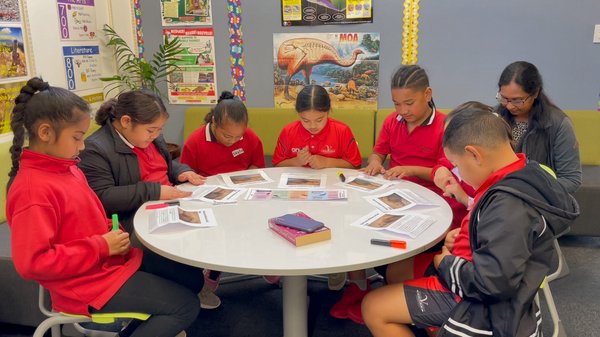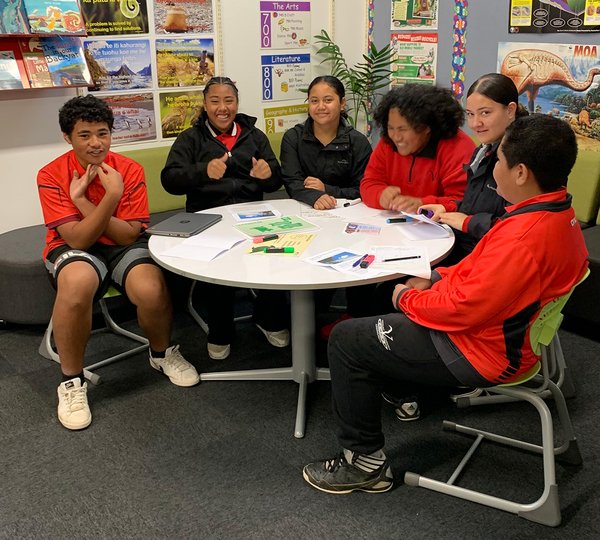A school principal praises Reciprocal Teaching - RT3T™
An interview with Shirley Hardcastle, Principal of Viscount Primary School and Julia Westera, creator of Reciprocal Teaching - RT3T™
Viscount Primary School is located in the heart of Mangere, South Auckland. The school has 26 Year 1 to 8 classes, with predominantly Pasifika (about 88%) and Māori (10%) students. Most students speak English as a second language (60%) and arrive at school with little English literacy.

Shirley: “When I first came here as principal, the juniors had a phonics-based approach to reading. They were reading the words but not understanding what they meant nor what they were reading about. So we were looking around to see how we could do this differently.
At this school what are the things that we really believe in – we want children to collaborate, we want them to work in teams, we want to view everybody as a successful learner, everyone can succeed – having that growth mindset – so it’s bringing all of those threads (together).
Our interest in reciprocal teaching (in NZ many teachers and students know it as RT3T™) was sparked by what we read and heard about RT3T™ at Mangere College and my previous experience with reciprocal approaches. As well, we had clear evidence that previous approaches to teaching reading were not working well enough. We had our first experience of RT3T™ in 2020 when we asked Mangere College for some of our ex-students to visit and to tell us more. As a bonus, they took on a leadership role and engaged our teachers in a memorable round of RT3T™.
RT3T™ fitted with our search for a better way – a way that was not just focused on literacy but also builds on our students’ cultural strengths, such as a desire to work collaboratively, empathy for the well-being of others, and their rich cultural and language backgrounds.
It also fitted with the need to address that most of our students are having difficulties with comprehending what they read, despite their decoding skills being at or above their age equivalent level. This means they tend to stay trapped in disproportionate underachievement.”
Julia: “RT3T™ is a modernised, contemporary approach to Reciprocal Teaching within a school-wide inclusive strategy. Reciprocal Teaching is one of the most powerful culturally responsive and evidence-based teaching methods that we have today. It was developed in the 1980s by Professor Annemarie Palincsar, and involves teachers using a scaffolded approach to teaching thinking skills essential to understanding text, within a collaborative approach.
With skilled cross-curricular implementation, RT3T™ has a high impact on achievement, literacy, collaborative and critical thinking skills, wellbeing and belonging. RT3T™ also engages and empowers learners of all ages, teachers, leaders, whānau and communities - and is a popular and powerful team-based way of teaching and learning for both academic and everyday learning.”

Shirley: “We started two years ago. At first, I didn’t think we needed RT3T™ because the general principles of reciprocal reading have been around for a long time… But we quickly realised that the reality is that teachers need deep and skilled support.
The aspects of it to me which are really important are around the mixed ability grouping, it is around the fact that the children step up and start to take over the role of teacher. They work together, they have turns at leading, and they are also able to assess themselves and their teamwork.”
Despite everything that’s happened with Covid we’ve been driving RT right throughout from Y3 to Y7-8, as has our management… and into maths, writing and general theme work... It’s very beneficial… it allows for other students who have been away to come and be quickly re-engaged… It’s been a great tool for us teachers to utilise in the classroom… It has allowed us to quickly settle our students down in their teams … and start thinking about learning… enhancing their thinking skills… We believe in Reciprocal Teaching RT3T™ and we believe that every school should be doing it.
– Year 7/8 team leader Melissa Malama-Talataina
After the first 7 months with RT3T™, despite periods of disruption, the year level results on the STAR showed that students in Y3 & Y4 made the most significant gains. This was closely followed by the Y5 to Y8 students. Overall the data showed that despite missing nearly half a year of schooling with Covid, students quickly regained their pre-Covid skill set, and continue to progress. Results also show that not only did students improve considerably on comprehension, but also on decoding scores.
Shirley: “I do think that this learning approach has the potential to make a huge difference. We are resonating with the way children understand and live their lives. They understand how to work in groups, they understand at a very deep level what it means to cooperate, what it means to help another person. The most exciting part is the enthusiasm of the students and staff who quickly see the benefits, such as more skilled and focussed reading and expressive language, and the way in which children stay engaged and supporting each other. They love leading.”
You can see the outstanding, Covid-defying results of Viscount’s three years of RT3T™ in this post.
